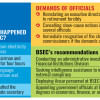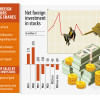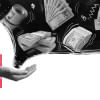How BSEC wasted funds on ineffective roadshows abroad
Less than a year after Prof Shibli Rubayat-Ul Islam was appointed as chairman of the Bangladesh Securities and Exchange Commission (BSEC) in May 2020, the regulator started holding roadshows abroad to lure in foreign investors and boost the local market.
The first roadshow was held in the United Arab Emirates in February 2021, but it was attended mostly by local intermediaries, businesses and non-resident Bangladeshis. The presence of foreigners was very thin.
In the years since, the BSEC has staged 17 additional roadshows in 11 countries.
The money to organise these events came mostly from listed companies owned by thousands of general investors as well as stock market intermediaries.
An analysis of the data shows that these companies spent at least Tk 50 crore to sponsor the events.
Officials from numerous firms said they had little choice but to spend as they felt pressured by requests from the regulator.
While the massive outlay from shareholders' funds raised questions, the roadshows also failed to boost foreign investors' confidence due to a lack of investible companies and good governance as well as frequent policy changes amid a worsening macroeconomic outlook.
In reality, many foreign investors sold off their shares in the stock market over the past three years, causing the net portfolio investment to fall.
Bangladesh Bank data showed that net portfolio investment stood at $111 million in the negative during the July-May period of FY24. It was $38 million in the same period of the previous fiscal year.
The BSEC alone organised seven roadshows in three countries. But as many critics pointed out that hosting such roadshows was not the duty of the stock market regulator, it joined hands with the Bangladesh Investment Development Authority (BIDA) thereafter.
UCB Stock Brokerage was the sponsor of the first roadshow in the UAE. The brokerage firm is a subsidiary of a listed company and is also regulated by the BSEC as a stock market intermediary, which makes the situation uncomfortable for the regulator.
Eastern Bank, local electronics giant Walton and Nagad, a mobile financial service provider, jointly sponsored roadshows in four cities in the US in mid-2021.
The same year that Nagad sponsored the event, it received approval to raise Tk 510 crore by issuing zero coupon bonds despite not being listed on the market.
Walton sponsored roadshows in two cities in Switzerland and the UAE while United Commercial Bank sponsored roadshows in two cities in the UK.
Pran Group, Alif Group, Green Delta Insurance and Minori Bangladesh, owner of Emerald Oil, also sponsored several roadshows.
Among stock market intermediaries, the Dhaka Stock Exchange (DSE), Chittagong Stock Exchange (CSE), Central Depository Bangladesh and Central Counterparty Bangladesh sponsored roadshows in France, Germany, and Belgium.
Top officials of several companies confirmed that they agreed to sponsor the events as the regulator had asked them to. They added that they felt pressured because a listed company cannot avoid a request from its regulator.
On top of that, the BSEC used former prime minister Sheikh Hasina's name, saying she would attend the events and that sponsorships would make her happy, sponsors said.
A top official of EBL said they spent around $150,000 to sponsor a roadshow held in the US.
A top official of UCB said they spent 2.5 lakh pounds to sponsor the UK roadshow and around Tk 1.10 crore for the Dubai roadshow.
"When a regulator asks us to sponsor an event, we have little option to ignore it," the UCB official said.
Several officials of Walton, UCB, DSE and CSE echoed those sentiments.
Al Amin, an associate professor at the Department of Accounting & Information Systems at the University of Dhaka, said organising roadshows is not a duty of the stock market regulator.
Moreover, how it organised the roadshows is questionable.
The costs of the events were borne mostly by listed companies or other companies that have regulatory interests in the BSEC.
"When a regulator takes benefits from the firms it regulates, how can it regulate them? This is totally illogical," Al Amin said.
"Most importantly, the BSEC used the funds of listed companies, which are ultimately shareholders' funds, and this impacted the profit of the companies. Did the roadshows benefit investors? Not at all."
Such roadshows can only be held by BIDA and with government funds, he said.
A number of roadshows were even held after the government instructed organisations to cut costs and restrict foreign tours.
The BSEC planned to organise another roadshow in Brazil last month, but it was postponed due to the anti-discrimination student movement.
A top banker said: "I don't know how a roadshow in Brazil would help us. The people of our country have little connection with Brazil. And Brazil does not even account for any significant investment.
"It is no more than organising a picnic with the fund of listed companies."
As such, it could not be expected that the country would attract foreign investors through these roadshows. In fact, the foreign portfolio investment declined despite the roadshows.
To hide the failure of the roadshows, the BSEC verbally ordered the DSE not to publish data on foreign portfolio investments publicly.
Al Amin said foreign investors are not interested in coming to a market that frequently adopts artificial market price mechanisms such as floor prices.
At the same time, there are very few investible products in the market.
The governance in the market is also problematic as policies change frequently and on a case-to-case basis, he added.
Foreigners started offloading their shares in 2020 when they predicted that the local currency would face significant devaluations.
The imposition of the floor price mechanism during the pandemic also severely dented their confidence.
Bangladesh's forex reserve has almost halved in the past two years. At the same time, the taka has depreciated by around 35 percent compared to the US dollar, as per central bank data.
Furthermore, when the BSEC launched floor prices in 2020 to stop the freefall of market indices, it went against the regulatory guidelines of many other countries. This was because they recognised that the mechanism risked rendering the local market illiquid as share selling would become tougher due to floor prices.
The floor prices were gradually removed but were brought back in mid-2022 amid the Russia-Ukraine war.
Prof Shibli Rubayat-ul Islam, former chairman of the BSEC, could not be reached for comment.

 For all latest news, follow The Daily Star's Google News channel.
For all latest news, follow The Daily Star's Google News channel. 








Comments